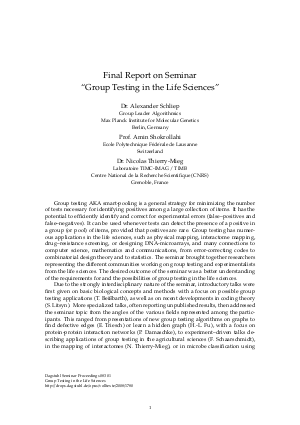08301 Final Report – Group Testing in the Life Sciences
Authors Alexander Schliep, Nicolas Thierry-Mieg, Amin Shokrollahi
-
Part of:
Volume:
Dagstuhl Seminar Proceedings, Volume 8301
Part of: Series: Dagstuhl Seminar Proceedings (DagSemProc) - License:
 Creative Commons Attribution 4.0 International license
Creative Commons Attribution 4.0 International license
- Publication Date: 2008-12-11
File

PDF
DagSemProc.08301.1.pdf
- Filesize: 436 kB
- 8 pages
Document Identifiers
Subject Classification
Keywords
- Group Testing
- Pooling
- Combinatorics
- Design Theory
- Error correcting
Metrics
- Access Statistics
-
Total Accesses (updated on a weekly basis)
0Document
0Metadata
Abstract
Group testing AKA smart-pooling is a general strategy for minimizing the number of tests necessary for identifying positives among a large collection of items. It has the potential to efficiently identify and correct for experimental errors (false–positives and false–negatives). It can be used whenever tests can detect the presence of a positive in a group (or pool) of items, provided that positives are rare. Group testing has numerous applications in the life sciences, such as physical mapping, interactome mapping, drug–resistance screening, or designing DNA-microarrays, and many connections to computer science, mathematics and communications, from error-correcting codes to combinatorial design theory and to statistics. The seminar brought together researchers representing the different communities working on group testing and experimentalists from the life sciences. The desired outcome of the seminar was a better understanding of the requirements for and the possibilities of group testing in the life sciences.
Cite As Get BibTex
Alexander Schliep, Nicolas Thierry-Mieg, and Amin Shokrollahi. 08301 Final Report – Group Testing in the Life Sciences. In Group Testing in the Life Sciences. Dagstuhl Seminar Proceedings, Volume 8301, pp. 1-8, Schloss Dagstuhl – Leibniz-Zentrum für Informatik (2008)
https://doi.org/10.4230/DagSemProc.08301.1
BibTex
@InProceedings{schliep_et_al:DagSemProc.08301.1,
author = {Schliep, Alexander and Thierry-Mieg, Nicolas and Shokrollahi, Amin},
title = {{08301 Final Report – Group Testing in the Life Sciences}},
booktitle = {Group Testing in the Life Sciences},
pages = {1--8},
series = {Dagstuhl Seminar Proceedings (DagSemProc)},
ISSN = {1862-4405},
year = {2008},
volume = {8301},
editor = {Alexander Schliep and Amin Shokrollahi and Nicolas Thierry-Mieg},
publisher = {Schloss Dagstuhl -- Leibniz-Zentrum f{\"u}r Informatik},
address = {Dagstuhl, Germany},
URL = {https://drops.dagstuhl.de/entities/document/10.4230/DagSemProc.08301.1},
URN = {urn:nbn:de:0030-drops-17806},
doi = {10.4230/DagSemProc.08301.1},
annote = {Keywords: Group Testing, Pooling, Combinatorics, Design Theory, Error correcting}
}
